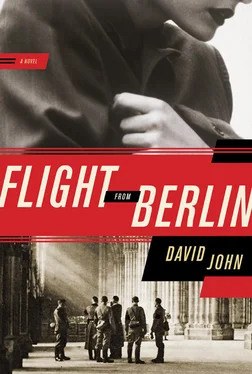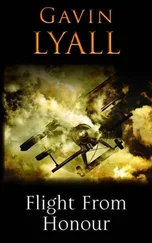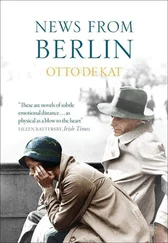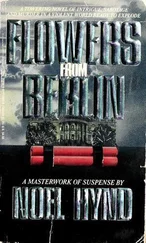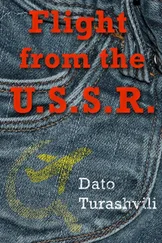David John - Flight from Berlin
Здесь есть возможность читать онлайн «David John - Flight from Berlin» весь текст электронной книги совершенно бесплатно (целиком полную версию без сокращений). В некоторых случаях можно слушать аудио, скачать через торрент в формате fb2 и присутствует краткое содержание. Жанр: Шпионский детектив, на английском языке. Описание произведения, (предисловие) а так же отзывы посетителей доступны на портале библиотеки ЛибКат.
- Название:Flight from Berlin
- Автор:
- Жанр:
- Год:неизвестен
- ISBN:нет данных
- Рейтинг книги:4 / 5. Голосов: 1
-
Избранное:Добавить в избранное
- Отзывы:
-
Ваша оценка:
- 80
- 1
- 2
- 3
- 4
- 5
Flight from Berlin: краткое содержание, описание и аннотация
Предлагаем к чтению аннотацию, описание, краткое содержание или предисловие (зависит от того, что написал сам автор книги «Flight from Berlin»). Если вы не нашли необходимую информацию о книге — напишите в комментариях, мы постараемся отыскать её.
Flight from Berlin — читать онлайн бесплатно полную книгу (весь текст) целиком
Ниже представлен текст книги, разбитый по страницам. Система сохранения места последней прочитанной страницы, позволяет с удобством читать онлайн бесплатно книгу «Flight from Berlin», без необходимости каждый раз заново искать на чём Вы остановились. Поставьте закладку, и сможете в любой момент перейти на страницу, на которой закончили чтение.
Интервал:
Закладка:
‘It’s a big transport hub, I guess, and because Hannah and her parents are going to be there. Don’t ask me why or how.’
They turned the corner into the narrow street behind the church where they’d left the Morris Oxford, and stopped dead.
Two policemen in green Orpo uniforms were on either side of the car, one of them crouched with his hand to the side window to shield the light, looking inside. The Orpo wagon was parked behind it.
Denham grabbed Friedl’s arm and together they spun on their heels and walked briskly back the way they had come.
‘Did you take your passport out?’ Denham said.
Friedl nodded and patted his breast pocket.
‘They’ll have alerted the local stations. If they’ve got our car, then they’ll expect us to be on a train or a bus out of here…’
‘So we steal a car,’ Friedl said. They were back in the town square.
‘Isn’t that easier said than done?’
‘We have a choice of three.’
Parked in front of the Hotel Westfalen-Stubchen were a rusted Citroen, a newish, dark blue Adler Standard 6, and a large farm truck with empty churns on the back.
Friedl walked smartly to the driver’s door of the Adler and opened it. ‘Who locks their car in a place like this? Get in.’
Denham threw the satchel into the passenger side and jumped in. Friedl felt in the glove compartment, then ran his hand under the dashboard, then under his seat. ‘They’ll be here somewhere…’
‘Hurry.’ The two Orpo men walked a few feet past the front of the car and entered the hotel.
‘Hey, if I’d left it to you we’d still be out there like rabbits in a field.’
He pulled down the shade, and the keys fell into his lap.
The starter motor fired the engine at once, and he reversed the car smoothly into the square. ‘German engineering,’ he said.
‘You’ve done this before.’
Friedl looked ahead, his mouth grim, his eyes determined.
‘Not much petroleum,’ he said, ‘but maybe enough to get us to Cologne. See if there’s a road map in here.’
Denham explored the contents of the glove compartment and found that day’s Volkischer Beobachter, a Party membership book with dues paid, and some group photos from a Strength Through Joy Rhine cruise.
‘Marvellous,’ he said. ‘We’ve stolen that Brownshirt’s car.’
Evening was drawing in as they turned onto the Cologne road, the sky a peach colour after the storm, with feathered, golden clouds.
It was after 11:00 p.m. when they saw the lights of Cologne’s suburbs winking in the distance. Friedl pulled over into a farm track. They tried dozing for a couple of hours in the car without much success. Denham knew he had to address their next, most immediate problem: money. They had no reichsmarks, and he couldn’t risk entering a bank in the morning and producing his passport to exchange currency. He got out and opened the boot of the Adler on the off chance it contained sequestered cash, but instead found something almost as useful.
‘You’re not fat enough for this,’ he said to Friedl, ‘but it might look all right with the belt tightened.’ Friedl turned to see Denham holding up the Brownshirt’s pressed, tailored, single-breasted, light brown dress uniform. ‘Think you could walk like a Nazi for a day?’
A t 6:00 a.m. they abandoned the Adler beneath the Gothic shadows of St Kolumba on the Herzogstrasse and walked through the bright, fresh morning along Cologne’s old city streets towards the Hauptbahnhof, the city’s main station. Denham was wearing his grey wool-flannel three-piece suit and a hat, with no luggage except an old satchel. Friedl walked with his hands behind his back in a pair of tight-fitting squeaky brown jackboots, enormous loose breeches, and a tunic pleated around his waist with a belt.
Chapter Fifty
Martha gripped the steering wheel of her mother’s russet brown Hanomag with a pair of driving gloves.
For all her misgivings about having Martha along, Eleanor felt pride in this woman who had refused to be dissuaded. ‘If we save three people,’ Martha had said with an airy sense of her own immunity, ‘it’s something that just has to be done.’ And for the first time trust, as unexpected as friendship, had come between them. The fact that Martha was clearly enjoying herself was beside the point.
She glanced at Eleanor. ‘Put your dark glasses on.’
They had arrived in Grunewald at 6:45 a.m. and parked at the end of Winklerstrasse, inconspicuous among the other cars. Soon, they saw a dark grey BMW with an ‘SS-’ number plate, almost camouflaged by the half-tones beneath the trees, gliding towards the Liebermann house at number 80. Jakob and Ilse must have been waiting inside the gate, because they emerged almost immediately and got into the backseat of the car. The door was held open for them by an unsmiling, porcine man dressed in a seersucker jacket and walking breeches, as if for a hike. He slammed it shut after them and adjusted the passenger seat and mirrors in preparation for the long journey across the country to Frankfurt, and from there to Basel in Switzerland. A young SS man was driving.
Martha started the engine and moved off at a discreet distance, following the BMW through the tree-lined suburbs of Dahlem, Zehlendorf, and Kleinmachnow until Berlin became sparser and the car passed up onto the new orbital autobahn. Soon it turned off near Lehnin, and twenty minutes after leaving Winklerstrasse they were driving at top speed on Hitler’s broad new superhighway heading southwest.
‘Isn’t this thrilling?’ Martha cried.
Perspective and scale changed on the great road, making the scenery vaster and the objects on the human scale-the farmhouses, tractors, and telegraph poles-smaller, like models on a railway set. Martha managed to overtake a Deutsche Post truck, but it was soon obvious that the 1930 Hanomag’s vertical windscreen and two-cylinder engine weren’t designed for the velocities now possible, and they watched the powerful BMW speed away from them, accelerating up the distant slope of the autobahn like a grey billiard ball. Eleanor hoped that Ilse and Jakob would think of something-anything-to slow the progress of that car.
‘At least we know where they’re going,’ said Martha. ‘What’s the name of the place again?’
‘Klinik Pfanmuller,’ said Eleanor. Finding in her handbag the piece of paper Ilse had given her, she added, ‘Bockenheimer Landstrasse, Frankfurt-am-Main.’
Jakob and Ilse had told her that Hannah’s letters from the sanatorium were so brief and vague that they feared she was being kept under sedation, until one letter in January thrilled them and gave them hope. Hannah explained that she was healthy and well and that she’d befriended someone who’d agreed to post her letter, which would otherwise be censored and returned to her by Dr Pfanmuller, who had complete charge of her. She had everything she needed, but was isolated in the ‘Haus Edelweiss’ part of the complex and treated like a royal prisoner, not permitted to talk to other patients or take her meals with them. At night her door was locked; the grounds patrolled; the gates guarded. On the one occasion she’d protested she was given electrotherapy and sedated for two days. She took exercise but, as a Jew, was not permitted to use the swimming pool. Doctors injected her daily with vitamins, gave her mineral supplements and mineral-water baths, and kept her on a dairy-free diet with plenty of raw spinach, so she was in good condition. All this was to maintain the fiction that she was a patient in need of a cure, and so she was given everything a luxury sanatorium could offer. Although Dr Pfanmuller told her she’d suffered a mental breakdown, her treatment did not include any form of psychoanalysis. He seemed to take satisfaction in telling her that the interpretation of dreams and the analysis of the unconscious mind were decadent Jewish ideas with no place in modern medicine. She had the impression there were other inmates of the Haus Edelweiss who, like her, the authorities had deemed it impolitic to put in a KZ. Her own outlook was uncertain. She feared that they were simply waiting for her name to fade in the world’s memory before moving her to a women’s camp. In the meantime, she had her health.
Читать дальшеИнтервал:
Закладка:
Похожие книги на «Flight from Berlin»
Представляем Вашему вниманию похожие книги на «Flight from Berlin» списком для выбора. Мы отобрали схожую по названию и смыслу литературу в надежде предоставить читателям больше вариантов отыскать новые, интересные, ещё непрочитанные произведения.
Обсуждение, отзывы о книге «Flight from Berlin» и просто собственные мнения читателей. Оставьте ваши комментарии, напишите, что Вы думаете о произведении, его смысле или главных героях. Укажите что конкретно понравилось, а что нет, и почему Вы так считаете.
